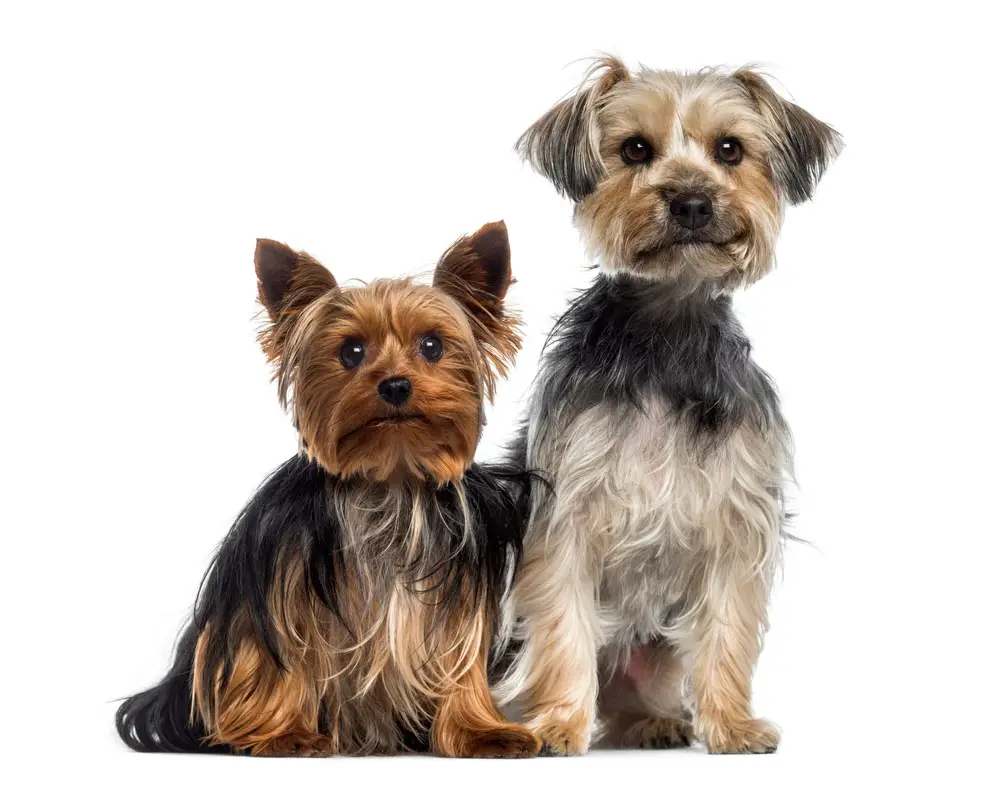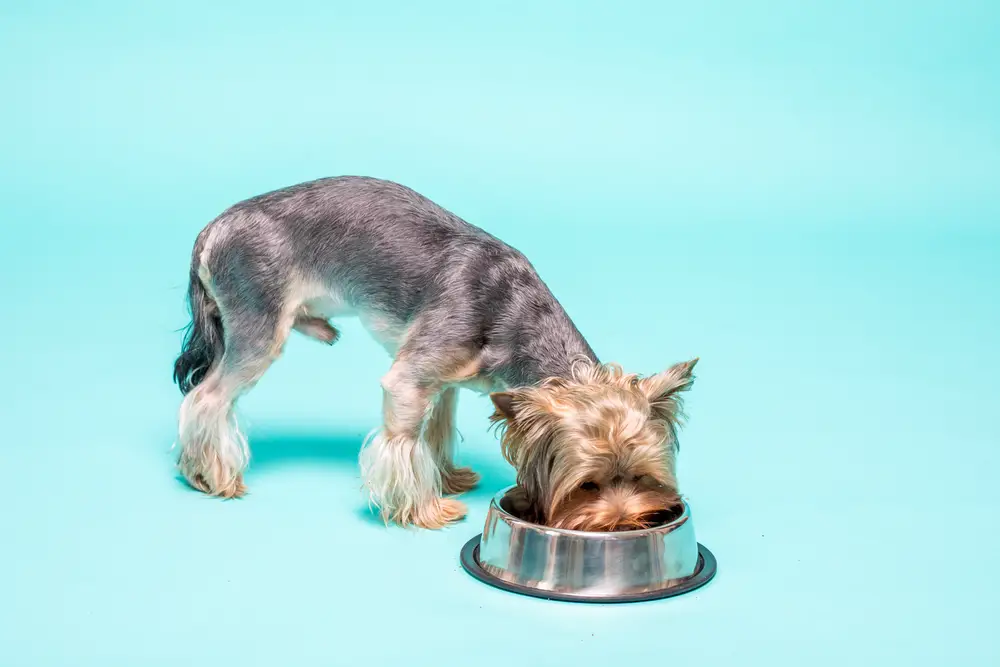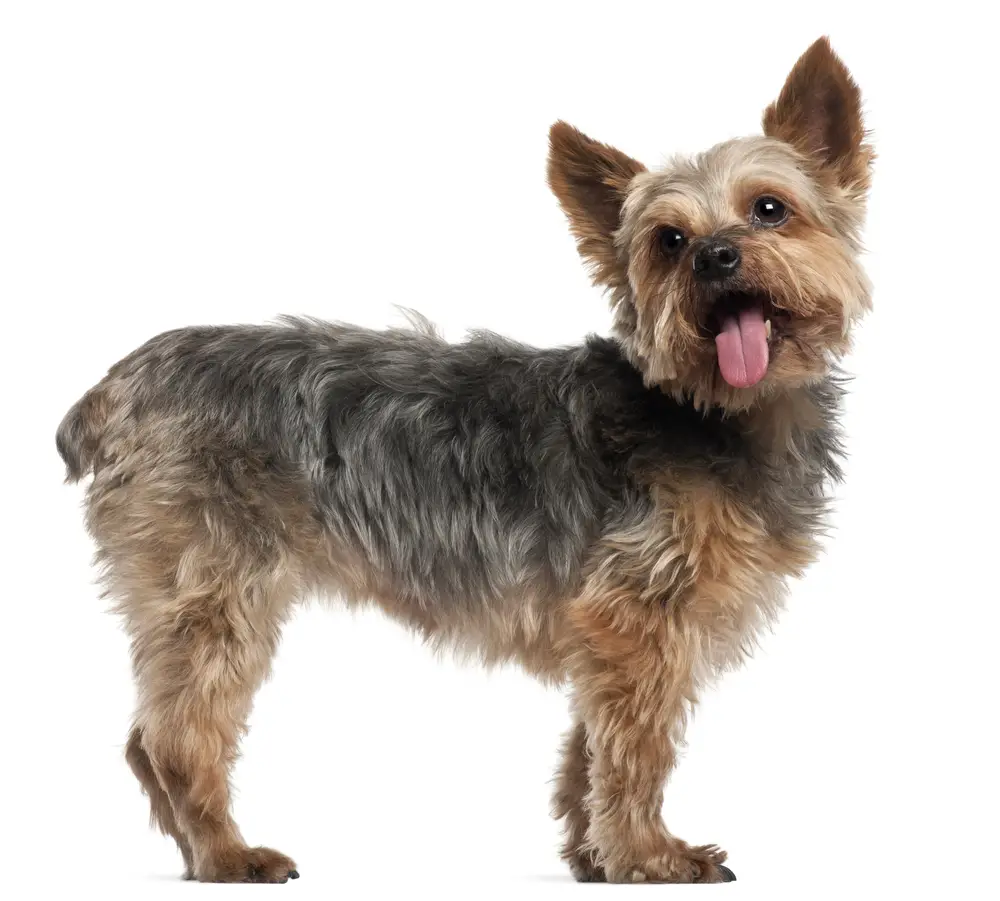Yorkie Size: How Big Do Yorkies Get?
Yorkie Size: How Big Do Yorkies Get?
 As a Yorkie owner, you probably have a lot of questions about your Yorkie. One of the most common questions people ask is, “How big is a full grown Yorkie?” As a toy breed, Yorkies are typically very small but their size can range a great deal. Many owners of Yorkshire Terriers can be concerned that their dog is too small or too large when compared with other Yorkies.
As a Yorkie owner, you probably have a lot of questions about your Yorkie. One of the most common questions people ask is, “How big is a full grown Yorkie?” As a toy breed, Yorkies are typically very small but their size can range a great deal. Many owners of Yorkshire Terriers can be concerned that their dog is too small or too large when compared with other Yorkies.
If you’re concerned about the size of your Yorkie, you may be concerned about health issues or even if your pup is actually a Yorkie or perhaps a mixed breed.
Expressions you may be familiar with such as “mini” or “toy” breeds can be found at the heart of the issue, due in part to breeders purposefully creating ever smaller Yorkshire Terriers.
Here’s what you should know about Yorkie size, including a healthy range, the average size of a Yorkie, and teacup Yorkie size.
How Big Is a Yorkie?

Jersey – Courtesy of Nadine Wallen
The AKC (American Kennel Club) had previously listed the minimum weight of a Yorkshire Terrier as 4 pounds (1.81 kg). However, breed standards have since changed, and now there is only a maximum weight of 7 pounds (3.17kg) for a Yorkshire Terrier full grown.
Regardless of this change, most Yorkshire Terriers find themselves fitting within the 4 pound to 7 pound range. Any Yorkshire Terrier full grown that is smaller than this would be considered too small, and find themselves with an increased risk of size-related health issues. These very tiny Yorkies are known as “teacup Yorkies.”
It is not uncommon, however, to find Yorkshire Terriers growing to weigh around 8 to 10 pounds (3.62 to 4.53 kg). This comes down to bone structure and whether the pup is overweight. A large Yorkie can also be the result of an incorrect pairing of dam and sire that were not quite able to produce standard-sized Yorkshire Terriers.
In some rarer instances, a Yorkshire Terrier can grow upward of 10 or even 15 pounds. In many cases, a very big Yorkie is simply a matter of another, larger breed of dog being introduced somewhere along the Yorkie’s bloodline. If your Yorkie is very large, you may not have a purebred Yorkie.
Despite all the standards introduced with regards to Yorkie weight, there has been no standardized height. You could expect an adult to reach somewhere between 6 and 9 inches, from the floor to their withers (the tops of their shoulders).
The Average Size of Yorkie Puppies
 There is so much growth in the first year of a Yorkie puppy’s life. While for some growth will be spread out evenly over the course of the first year, others will see growth spurts with incredibly fast and noticeable growth for some months, and seemingly nothing for periods of time.
There is so much growth in the first year of a Yorkie puppy’s life. While for some growth will be spread out evenly over the course of the first year, others will see growth spurts with incredibly fast and noticeable growth for some months, and seemingly nothing for periods of time.
Regardless of how your puppy seems, whether it looks overweight or not, under no circumstances should a Yorkie puppy be placed on any sort of diet, nor should they be over exercised. It is absolutely and completely the norm for puppies to have “puppy fat,” making their appearance seem somewhat round and chubby. This is totally to be expected and nothing to worry about.
In fact, to help your Yorkie puppy reach their healthy growth potential, it’s important to let them eat whenever they like up until a certain age and even consider supplements like Tomlyn nutritional supplements for puppies.
Somewhere around the age of 9 months, Yorkie weight gain will start to slow. At this time, the Yorkie will continue to grow in length as well as height, resulting in a much leaner appearance. Yorkshire Terriers, as with all dogs, will start to take on a much sleeker form as the muscles are just about fully developed.
How Does a Yorkie Compare to Other Toy Breeds?
When compared to other toy dog breeds, the Yorkie isn’t quite the smallest, although it’s a close race. The smallest four toy breeds are:
- Chihuahua: 2 – 6 lbs, 6 – 9 inches
- Pomeranian: 3 – 7 lbs, 8 – 11 inches
- Yorkshire Terrier: 4 – 7 lbs, 6 – 9 inches
- Pug: 13 – 20 lbs, 12 – 14 inches
While the Yorkie isn’t the smallest, coming in third behind the Chihuahua and the Pomeranian, it’s very close.
The smallest dog on record in terms of height is a chihuahua Milly who is 3.8 inches tall. Dancer, a long-haired chihuahua, is the smallest dog by weight at just 18 ounces and 5″ tall.
According to some reports, the smallest dog ever recorded was a Yorkshire Terrier named Sylvia who lived in England and died in 1945. Sylvia was reportedly 2.5″ tall and weighed about 4 ounces.
How Big is a Teacup Yorkie?
Miniature dogs have brought their fair share of controversy over the years. Neither the American Kennel Club nor other reputable kennels recognize the Teacup, or any other term implying a tiny size for that matter, as acknowledged variants of the breed, or even as a separate variety.
The main reason the term even exists is because someone, once upon a time, thought that if a small dog is desirable, then even smaller would be even more desirable. Over time, just about every toy and small-sized dog wound up being bred down, despite all the risks to the dogs’ health that come as a result of the ever smaller size.
A teacup Yorkie refers to any Yorkshire Terrier that is less than 4 pounds.
Teacup Yorkies Often Have Health Issues Related to Their Small Size
 Many will have you believe that these dogs are “special” in some way. However, taking an already small dog and shrinking it further and further intentionally is putting the dog’s health in serious jeopardy. If you take into consideration that the dog is getting smaller and smaller, then obviously so too are all of their internal organs. Many teacup Yorkies wind up as small as 2 lbs, and only 4 to 5 inches from shoulder to shoulder.
Many will have you believe that these dogs are “special” in some way. However, taking an already small dog and shrinking it further and further intentionally is putting the dog’s health in serious jeopardy. If you take into consideration that the dog is getting smaller and smaller, then obviously so too are all of their internal organs. Many teacup Yorkies wind up as small as 2 lbs, and only 4 to 5 inches from shoulder to shoulder.
The process is accomplished by procuring a male and a female that are both undersized themselves, so that when they’re paired together, they will have an increased likelihood of producing very tiny puppies. The average weight of 4 – 7 lbs is already tiny enough as it is, and breeding a Yorkie to be even smaller can create many serious health issues such as:
- A weakened immune system
- Hypoglycemia
- Fragile bones
- Heart and respiratory problems
- Liver problems
- A shorter life span
- An increased chance of being susceptible to hip, knee, and neck injuries
Many teacup Yorkshire Terriers and their offspring can even die during the birthing process itself. Since their organs are inadequately sized, including reproductive organs, this can often lead to all sorts of birthing complications.
If you are the owner of an adult Yorkie that is less than 3 lbs, then it is highly recommended that you look out for any potential problems such as these. Your vet should also be on the lookout for signs of the following issues.
- Collapsed trachea: This is when the trachea, or windpipe begins to collapse, resulting in a characteristic honking cough as the air is struggling to be squeezed through. It’s important to use a no-pull soft harness with any Yorkshire Terrier but especially with teacup Yorkies.
- Luxating patella: This is when the kneecap slips from its correct position.
- Hip dysplasia: This is when the hip joint has slipped out of it’s proper sitting point within the hip socket.
You must also be aware of outside temperature changes. A teacup Yorkie will be very sensitive to cold weather and will need protection in the form of a sweater like this soft fleece puppy sweater and anti-slip dog boots. They’ll also very easily succumb to overheating in the hot summer months.
How Big Can Yorkies Get?
 On the other side of the coin, there are many owners who’ve grown concerned that their Yorkshire Terrier may have become too large. While you may be expecting your Yorkie to fall somewhere around the 4 pound mark, remember that the American Kennel Club standards account for a weight of up to 7 pounds if you want to bring them into the show ring. So this in turn means that there are many, perfectly healthy purebred Yorkies running around at 8-9 pounds or even more.
On the other side of the coin, there are many owners who’ve grown concerned that their Yorkshire Terrier may have become too large. While you may be expecting your Yorkie to fall somewhere around the 4 pound mark, remember that the American Kennel Club standards account for a weight of up to 7 pounds if you want to bring them into the show ring. So this in turn means that there are many, perfectly healthy purebred Yorkies running around at 8-9 pounds or even more.
Remember, these things cannot always be planned for. In every litter, there will be a variety and range of body structures. While you can look to the dam and sire to get some idea of how you can expect the puppies to come out, genes as far back as 5, 10, or more generations can reveal themselves and play a contributing role in Yorkie size and weight.
It’s very uncommon, however not impossible, that every now and then a purebred Yorkie will be born that is much, much larger than expected. In many cases, there can be another breed, unbeknownst to the owner, mixed into the bloodline, despite being a registered purebred. The American Kennel Club guidelines state that a pedigree of three generations is required for a dog to be classified as a purebred. This means that going back 5 or 10 generations can be a larger dog that accounts for your large Yorkie.
Unintended pairings can also be a possibility, though the AKC does provide DNA testing. In most cases this is voluntary, however it can be mandatory. This holds especially true for any imported dogs, frequently used sires due in part to their higher impact on AKC stud books, and when done during random inspection visits to breeding kennels. Without DNA testing in this scenario, breeders are placed on the honor system when providing sire and dam information. If incorrect information has been provided, purposefully or by mistake, the sire listed on the registration may very well not be the actual sire.
 Also, it’s worth remembering that two dogs can impregnate a female at the same time. There have been a few noted cases of a female tying with the intended Yorkshire Terrier and also another dog of a different breed, and just the Yorkie is listed as the sire, resulting in mixed breed dogs. In many cases, these do indeed come out larger than you might expect.
Also, it’s worth remembering that two dogs can impregnate a female at the same time. There have been a few noted cases of a female tying with the intended Yorkshire Terrier and also another dog of a different breed, and just the Yorkie is listed as the sire, resulting in mixed breed dogs. In many cases, these do indeed come out larger than you might expect.
Just because a Yorkie has another breed mixed in does not mean that it’ll necessarily look vastly different from other purebred Yorkies. Many other, larger breeds do indeed look quite similar to the Yorkshire Terrier. Common examples include the Australian Terrier and the Australian Terrier which averages 12 to 14 pounds.
One good way to tell if your Yorkshire Terrier is all Yorkie is to look at their ears.
While some purebred Yorkies are in possession of floppy ears, it’s quite rare. If the ears are drop ears and have no stand, and your dog is much larger than you would otherwise have expected, you’ll need to take into consideration that there may be another breed somewhere in the Yorkie’s bloodline.
For those Yorkies that do come out over 9 pounds in weight, you should make sure to thoroughly evaluate them and be sure that it’s not just excess weight. Still, even a 10 pound dog may not be overweight as long as his or her height is somewhere around the 10- to 11-inch mark. Remember, weight will play a relevant role with regards to height.
How to Tell if Your Yorkie is Overweight
Being overweight is not a particularly common trait among the Yorkshire Terrier breed, however any dog is capable of carrying excess weight, so don’t completely rule it out as a possibility. For Yorkies that do weigh in at over 10 pounds, your vet should perform an examination to see if there is a need to lose weight.
And remember, don’t rush it. Any weight loss prescribed by your vet should be a slow, gradual process.
Just like with people, there are two key pillars to losing weight and keeping healthy: diet and exercise. Let’s examine the two.
Diet
Many suggest that you should allow the Yorkie to ingest the same quantity of food as it normally does, however with a decrease to the overall calorie count. There are several ways in which you can achieve this. You may want to stick with the kibble you are already feeding to your Yorkie, however remove some of the food and replace it with fruits such as raspberries and blueberries, or veggies like broccoli, carrots, peas, or sugar snap peas. You may also want to give home cooking a go. This will allow you the ultimate control over any and all ingredients, allowing you to place more of an emphasis on fruits and vegetables.
Alternatively, you may simply wish to swap out your Yorkie’s dog food to a diet dog food brand. There are many great brands available which also offer a healthy weight formula, so you can offer your Yorkie a great, top quality food with a lower calorie count. It also helps to make a change to healthier snacks, too.
If your Yorkie isn’t already on a high-quality diet, it’s time to switch to a quality kibble like Merrick Classic Small Breed Recipe and avoid giving your Yorkie table scraps. Yorkies are notoriously picky eaters and table scraps may make them stop eating kibble completely.
Exercise
If your Yorkie is in need of shedding a pound or two, once you’ve received the go ahead from your vet, increase your Yorkie’s exercise by 10 minute intervals. If the daily routine is a 20 minute walk, for example, up it to 30 minutes. And make sure you’re walking at a brisk pace.
The Yorkie Stages of Development

Dog experts have identified several distinct, definitive developmental stages that cover the first few years of a Yorkshire Terrier’s life. These stages can be used to give a greater picture of how much your Yorkie should weigh. It should be noted, however, that certain outside factors such as your Yorkie’s genetic disposition can affect how it grows.
Sucklings
The stage at which your Yorkie is a suckling starts from the moment they are born and will last until they’re roughly six to seven weeks old. They’ll start to open their eyes at this time and learn how to walk. Relatively speaking, the growth in this stage is minimal, however, to a dog of this small size, it’ll be extremely noticeable. This is a rapid growth period and you’ll see them reach somewhere around a quarter of a pound.
Puppies
The stage at which your Yorkie is a puppy is defined as being between seven weeks and up to six months of age. At this stage, Yorkies will be starting to explore the world around them and will be developing new traits in their personality. This is the point at which you’ll want to start training them, as at this point they’ll be at their most capable of learning new behaviors. Most Yorkshire Terriers at this stage will be growing to roughly two and a half pounds, or 1.13 kg.
Youngsters
Next is the youngster stage, from six months of age up to ten months. By this point, your Yorkie will already have started picking up their signature Yorkshire Terrier traits. Their hair will grow long, and they’ll be full of energy for play time. By the end of their youngster stage, they’ll have almost doubled their weight to around 4 and a half pounds, or just over 2 kg.
Young Dogs
 By now, Yorkshire Terriers are considered to be adults. That’s not to say, however, that the growing will stop any time soon. This stage of development will last until your Yorkie reaches around 2 and a half years of age, so you can expect to see their weight continuing to increase gradually. Since growth is a much slower process around this age, you may not even notice any signs of their growing.
By now, Yorkshire Terriers are considered to be adults. That’s not to say, however, that the growing will stop any time soon. This stage of development will last until your Yorkie reaches around 2 and a half years of age, so you can expect to see their weight continuing to increase gradually. Since growth is a much slower process around this age, you may not even notice any signs of their growing.
Adult Dogs
By the time your Yorkie reaches the age of 4, they’ll be considered to be a fully grown adult. A full grown Yorkie should be weighing in at approximately 6 and a half pounds, or 3.17 kg. This is generally considered to be the point at which your Yorkie will stop growing in height. When measuring their height to their withers (the tops of their shoulders), you should see the height that they’ll typically remain at throughout the rest of their life.
Changes to Size Throughout Adulthood
Your Yorkie will most likely stop growing in height once they reach 4 years old. They may very well continue to change in size well into their adult years. Weight can play a very large role in a Yorkshire Terrier’s overall size, and even the tiniest bit of weight gain can influence how they look. And while it may appear that they’re continuing to grow, a quick measurement will let you know that they’re still the same height.
Sticking to healthy diet and exercise plans throughout your Yorkie’s life is important. The Yorkshire Terrier breed can be quite susceptible to weight fluctuations, and any changes in lifestyle and appetite will lead to changes in how they eat. It’s therefore integral that you keep a constant eye on their diet and make sure to make changes accordingly where necessary in order to avoid any potentially major size changes.
Factors that Can Affect Your Yorkie’s Rate of Growth
There are numerous reasons how and why your Yorkie may not be following the same path of development as others. The following factors can have an effect upon how large your Yorkie can get, and when they’ll stop growing.
Genetics
As with humans, genetics play a huge role in how your Yorkie grows. If your Yorkie was procured from a breeder, you should have received information regarding their parents. You’ll be able to compare their measurements and get some sort of general idea regarding how your Yorkie might grow up.
There are many ways that genetics can affect your dog. Some genes are stronger than other genes, and while your Yorkie pup will take on traits that can be attributed to both parents, sometimes one parent’s genetics will just have a stronger role to play than others.
Diet

Your pup’s diet will have a huge effect on the shape of their body. Not only will it determine their size, but certain ingredients can have an effect upon how the bones will grow and their overall health. You should always make sure to feed your Yorkie a high-quality kibble like Merrick Small Breed Recipe and offer nutritional snacks like NuturVet VitaPet Puppy Daily Vitamins.
Yorkies with a balance diet full of all the ingredients they require to stay fit and healthy will almost always grow more rapidly than a dog eating cheaper alternatives packed with fillers.
You should be sure to find foods high in protein, especially for puppies in the early developmental stages. In addition to an abundance of protein, your dog is going to need minerals, vitamins, calcium, and much more. It’s especially important as your puppy is growing to add nutritional supplements like Tomlyn if they are a picky eater, hypoglycemic, or don’t seem to be thriving.
Be wary of feeding them too much, though. This can lead to too much growth too fast which can cause joint problems or obesity. If a Yorkie puts on too much weight early on in their life, it can change the way they grow, such as shrinking their bones under the pressure of their increased body weight, for example.
Exercise

Sophie – Courtesy of Dawn Mitchell
Any dog requires exercise, but Yorkies have considerably high energy levels and can be expected to stay active throughout the day. It’s recommended that you should take your Yorkie on at least two 30 minute walks every day.
As with all dogs and humans, regular exercise will help your Yorkie to stay in shape, and will aid greatly in their development cycle during their early years.
Medical Conditions
If after your Yorkie’s 4th year they are still continuing to gain height, they could very well be suffering from acromegaly, a condition concerning pituitary gland issues. The Yorkie will be releasing too many growth hormones, causing them to continue to grow beyond a healthy size.
Your vet will be able to perform tests that can diagnose this issue. They may even walk you through a treatment plan that can stunt your Yorkie’s growth, helping them stay healthy.
Senior Yorkies
Once your Yorkie reaches seniority, all size-related changes will cease. This stage typically occurs between the ages of 8 to 10 years. Some Yorkshire Terriers may enter this stage earlier depending on the overall quality of their health.
Your Yorkie’s increasing age will be marked with a decrease in their levels of activity. You can expect to see them spending more time laying around and sleeping. It’s important to make adjustments to their diet throughout this time. If you were to continue feeding them the same amount of food as you would when they were a young adult, you may see increased weight gain and the onset of heart related issues.

